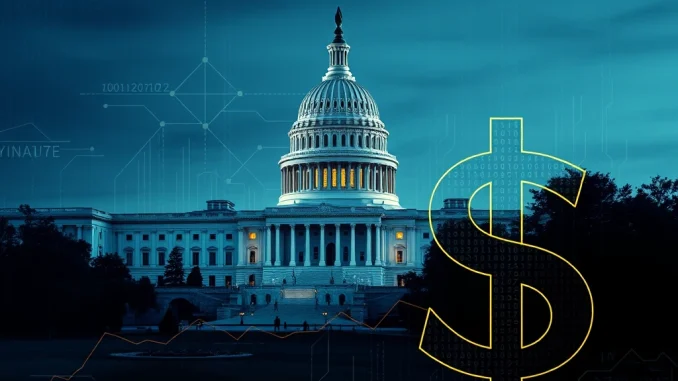
Breaking news from the intersection of traditional finance and digital currency: The U.S. Senate has just passed the GENIUS Act, a significant piece of legislation aimed at stablecoins. But what does this mean beyond the headlines? According to a leading voice from Germany’s largest commercial bank, Deutsche Bank, this move isn’t just about regulating crypto assets; it could be a strategic play to bolster the global standing of the US dollar.
The GENIUS Act: A New Stablecoin Bill on the Horizon
Marion Laboure, a respected strategist at Deutsche Bank, recently shared her insights following the Senate’s final vote on the GENIUS Act. This proposed law focuses on creating a regulatory framework for stablecoins – digital currencies designed to maintain a stable value, often pegged to traditional assets like the U.S. dollar. While the full details of the act are extensive, its core aim is to provide clarity and oversight for these digital assets.
Why is a Stablecoin bill drawing attention from major global banks? Stablecoins, particularly those pegged to the US dollar, have seen explosive growth. They serve as a crucial bridge between the volatile world of cryptocurrencies and traditional finance, enabling faster, cheaper transactions globally. However, their rapid rise has also raised concerns about consumer protection, financial stability, and illicit use. Legislation like the GENIUS Act seeks to address these concerns by bringing stablecoins under a defined regulatory umbrella.
Could This Legislation Boost US Dollar Dominance?
This is where Laboure’s analysis becomes particularly compelling. She argues that the GENIUS Act has the potential to significantly strengthen the US dollar‘s global dominance. Her reasoning centers on a few key points:
- Attracting Overseas Liquidity: By providing regulatory clarity and stability, U.S.-regulated dollar stablecoins become more attractive to individuals, businesses, and institutions outside the United States. This regulatory stamp of approval could encourage more foreign capital to flow into dollar-pegged digital assets, effectively increasing the global pool of ‘digital dollars’ held outside traditional banking systems.
- Accelerating Digital Dollar Use: While the U.S. explores the concept of an official central bank digital dollar (CBDC), regulated private stablecoins could serve as a de facto digital version of the dollar available globally much sooner. The GENIUS Act could accelerate the adoption of these digital dollars for everything from international remittances to cross-border trade and digital payments.
- Expanding Reach in Developing Countries: Laboure specifically highlights the potential for the US dollar‘s use to expand in developing countries. Many of these nations may lack robust traditional financial infrastructure or are still years away from implementing their own CBDCs. Regulated dollar stablecoins could offer a more accessible, stable, and efficient way for people and businesses in these regions to transact using a globally accepted currency, bypassing local financial limitations.
In essence, the argument is that by regulating dollar stablecoins, the U.S. isn’t just taming a corner of the crypto market; it’s potentially creating a powerful new digital rail for the US dollar to travel on globally, reinforcing its position as the world’s reserve currency in the digital age.
Stablecoins vs. the Official Digital Dollar: What’s the Difference?
It’s important to distinguish between privately issued, albeit regulated, stablecoins and a potential official U.S. Central Bank Digital Dollar (CBDC). A CBDC would be a direct liability of the Federal Reserve, essentially digital cash issued by the central bank. While the U.S. is researching a CBDC, its development and implementation are still uncertain and likely years away.
Regulated stablecoins, on the other hand, are issued by private companies but would operate under specific rules and oversight defined by legislation like the GENIUS Act. Laboure’s point is that these regulated private stablecoins could effectively fill the role of a widely used Digital dollar globally in the interim, offering many of the benefits of digital currency (speed, lower cost) while being backed by the stability of the US dollar.
Global Implications and Challenges Ahead
If Laboure’s assessment is correct, the GENIUS Act could have significant global implications. It could solidify the US dollar‘s role in the future of digital finance, potentially giving the U.S. an advantage over countries that are slower to adopt digital currency frameworks or whose own currencies are less stable.
However, challenges remain. The specifics of the regulation matter greatly – striking the right balance between fostering innovation and ensuring stability and consumer protection is crucial. There will also be geopolitical considerations, as other nations may view this as an attempt to further entrench US dollar dominance and could accelerate their own efforts to find alternatives.
Conclusion: A Strategic Move for the Digital Age?
According to Deutsche Bank’s Marion Laboure, the Senate’s passage of the GENIUS Act is more than just crypto regulation; it’s a potentially strategic move with profound implications for the global financial landscape. By creating a framework for stablecoins, the U.S. could pave the way for regulated digital dollars to proliferate worldwide, attracting liquidity and expanding the dollar’s reach, particularly in emerging markets. While the full impact remains to be seen and challenges are present, the GENIUS Act highlights how traditional financial powers are beginning to leverage digital assets to reinforce their positions in the evolving global economy, potentially strengthening US dollar dominance in the digital era.



